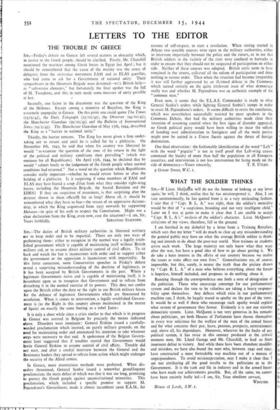WHAT THE SOLDIER THINKS
Sue—If Lieut. McQueen will do me the honour of looking at my letter again; he will, I think, realise that he has misinterpreted it. Also, I am sure unintentionally, he has quoted from it in a very misleading fashion. I said that if " Capt. B. L. A." was right, then the soldier's mentality would be that of "a suspicious, brooding and not very intelligent child." Later on I was at pains to make it clear that I am unable to accept " Capt. B. L. A.'s " analysis of the soldier's character. Lieut. McQueen's criticisms of my views, therefore, fall to the ground.
I am fortified in my disbelief by a letter from a Training Battalion, which says that my letter "will do much to clear up any misunderstanding the general public may have on what the average British soldier is think- ing and intends to do about the post-war world. New trainees or students arrive each week. The large majority not only know what they want after the war, but have a good idea of how to go about getting it. We do take a keen interest in the affairs of our country because we realise the issues at stake affect our own lives." Generalisations are, of course, impossible, but this, surely, is nearer the truth than the picture drawn by " Capt. B. L. A." of a man who believes everything about the future is hopeless, himself included, and proposes to do nothing about it.
Running through the correspondence one finds a note of denigration of the politician. Thpse who encourage contempt for our parliamentary system and declare the vote to be valueless are taking a heavy responsi- bility upon themselves. Any defects which exist in our parliamentary machine can, I think, be largely traced to apathy on the part of the voter. It would be as well if those who encourage such apathy would explain what system of government they favour. Evidently it is not our existing democratic system. Lieut. McQueen is not very generous in his remarks about politicians, yet both Houses of Parliament have shown themselves in every way solicitous for the welfare of the men of the armed forces and for what concerns their pay, leave, pension, prospects, entertainment and, above all, his dependants. Moreover, whatever be the faults of our political system, it has twice in this century produced at the critical moment men, Mr. Lloyd George and Mr. Churchill, to lead us from imminent defeat to victory. And while there have been abundant muddles and mistakes, we have also found the men who, between 1940 and 1945, have constructed a most formidable war machine out of a morass of
unpreparedness. To avoid misinterpretation, may I make it clear that I am not attributing all the good results to the politicians or to the Government. It is the rank and file in industry and in the armed forces who have made our achievements possible. But, all the same, we cannot have been entirely badly led.—! am, Sir, Your obedient servant,
House of Lords, S.W. I.
WINSTER.


























 Previous page
Previous page